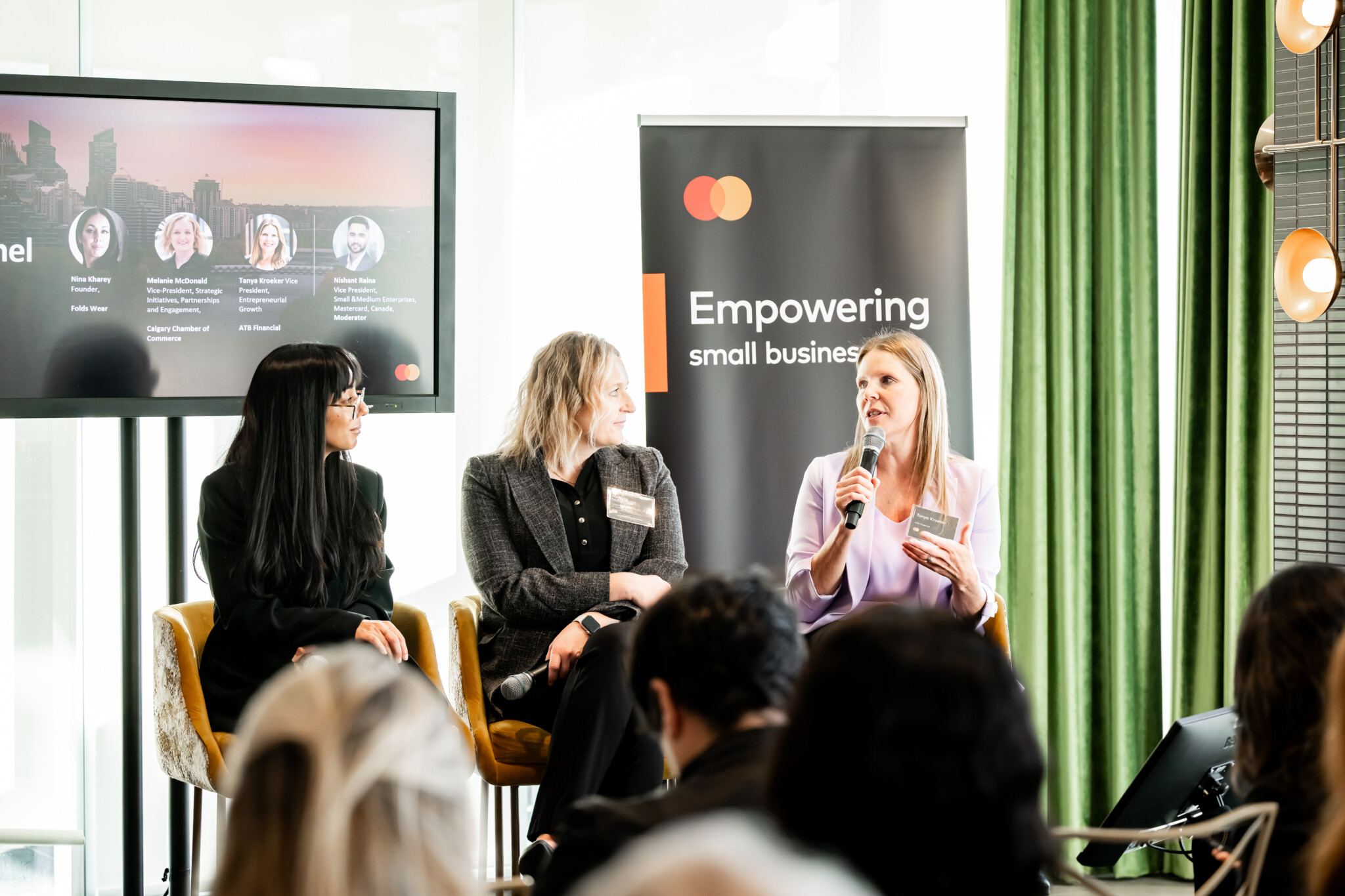Small- and medium-sized enterprises (SMBs) are the backbone of the Canadian economy, and that backbone needs support. These businesses—which constitute nearly 98 percent of all employer businesses in Canada and employ two-thirds of the private sector workforce—are celebrated but often left to navigate a complex maze of operational challenges, digital threats, and financial pressures largely on their own.
The support provided in the past has too often been transactional: offer a product or service and hope it fits. But as the nature of being a small business owner evolves, a more holistic and responsive approach is required. It’s no longer enough to simply process a payment; the new imperative is to empower small business owners with support that goes beyond the transaction.
This was the central theme that emerged from a panel discussion at the Mastercard Small Business Community event hosted in Calgary on October 21st during the city’s Small Business Week. The conversation, moderated by Mastercard’s vice president of small & medium enterprises in Canada, Nishant Raina, brought together a small-business founder, a local chamber of commerce executive, and a representative from ATB Financial. It peeled back the layers of the SMB experience, revealing that the path to resilience is paved not just with individual tenacity but with collaborative support, digital enablement, and unwavering security.
The insights from the event in Calgary tell a story that transcends provincial borders. They sketch a blueprint for how corporate Canada can move beyond a purely commercial relationship with SMBs and become a genuine partner in their growth. Mastercard, through its expanding suite of non-transactional resources and community-building initiatives, is operationalizing this precise blueprint.

The small business crucible: Agility amidst adversity
The panel gave voice to the on-the-ground realities of entrepreneurship. Nina Kharey, founder of Folds Wear, provided a powerful case study in agile leadership. Her journey from a women’s wear line worn by celebrities to manufacturing premium, sustainable scrubs is a masterclass in pivoting. When the pandemic hit, she saw a problem and used her skills to solve it, creating medical-grade masks and then reimagining health-care apparel.
Her story, however, also highlights the persistent hurdles. “Inventory… we sold out in 45 minutes,” Kharey explained. “The technology is super expensive… I could find money, get inventory, sell it, and then I’d have to pay people, pay stuff, and then I wouldn’t have money to buy more inventory.” This cash flow rollercoaster is a familiar refrain for small business owners. Just as she found a rhythm, external shocks—like sudden tariffs—forced another pivot, ultimately bringing her manufacturing back to Canada.
Kharey’s advice was distilled from this turbulence: “The second you let go and just start going with the flow, things just start happening.” For her, success came from deep product knowledge, understanding her customer, mastering her margins, and, crucially, building strategic partnerships. “It takes a village,” she affirmed. “Partnerships and collaboration… it’s huge for me.”
This sentiment was echoed by Tanya Kroeker of ATB Financial, who emphasized that entrepreneurs “don’t have to do it alone.” She described the “lonely” journey of a business owner who lacks the built-in C-suite of a large corporation. The role of institutions, therefore, is to be a “champion and a connector,” rallying an ecosystem of support from government, industry partners, and other entrepreneurs. “When they thrive, communities thrive, our economy thrives,” Kroeker stated, framing SMB success as a collective, rather than individual, outcome.

Community as a competitive advantage
The panel consistently returned to the theme of community as a critical, yet often undervalued, business asset. Melanie McDonald of the Calgary Chamber of Commerce articulated this perfectly, highlighting the dual power of collective action. First, there is advocacy: “There’s power in numbers, for sure… It’s a lot easier for us to go to government, to policymakers, and say we are representing the masses.”
Second, and perhaps more profoundly, is the power of peer-to-peer support. The Chamber hosts dozens of events annually to foster this sense of community. “Sometimes you think you might know the solution to a problem,” McDonald noted, “but once you have mentors around you who are also business owners, and you start brainstorming and hearing different ideas… you take those tools and you implement them.” This collaborative, non-competitive spirit is a vital antidote to the isolation of entrepreneurship.
This aligns directly with Mastercard’s focus on building community as a core pillar of its approach to supporting small businesses. It’s an acknowledgment that a resource hub or a digital tool, while valuable, is most powerful when paired with human connection. The company’s Small Business Community events, like the one hosted in Calgary, are designed to create these peer networks and mentorship opportunities, translating national expertise and the company’s global network into local context and connection.

The non-negotiable pillars: Digital support and cybersecurity
If community provides the support network, then digital resources and cybersecurity provide the operational foundation. The panel identified both as table stakes for modern small businesses.
Mastercard’s own Canadian survey data from fall 2025, cited in the panel, underscores the scale of the challenge. More than half (53 percent) of small businesses struggle to keep up with changing technology, and a similar proportion (52 percent) face challenges in accessing affordable cybersecurity tools. Nearly half (48 percent) find the time spent simply researching solutions to be a major burden.
For a small business owner, time is the scarcest resource. Every hour spent wrestling with digital onboarding, manual bookkeeping, or researching cyber insurance is an hour not spent on innovation, sales, or serving customers. This is where Mastercard’s focus on “digital enablement” and support aims to make a tangible impact. Modern payment systems and cash flow management solutions are not just about efficiency; they are about freeing up entrepreneurial energy. As the panel host concluded, “Digital first… it’s a non-negotiable right now.”
Similarly, the discussion on cybersecurity moved it from an IT issue to a core matter of trust and reputation. McDonald shared that even the 134-year-old Calgary Chamber had recently increased its cybersecurity insurance, acknowledging the very real threat. “For a lot of small businesses, they just don’t know where to start,” she said, pointing to the Chamber’s role in connecting members with experts and advocating for fairly priced insurance.
Here, Mastercard’s value proposition leverages its global expertise in cybersecurity and translates it into local, usable protections for Canadian SMBs. Its free cybersecurity assessment tool, offered through the Mastercard Trust Centre in partnership with Digital Main Street, is a prime example. It provides a practical, accessible entry point for businesses that know they need to be secure but don’t know where to begin.

Mastercard’s evolving role: From payment provider to ecosystem architect
Drawing from the panel discussion and Mastercard’s stated objectives, a clear picture emerges of a company consciously expanding its role in the small business landscape. It is positioning itself not merely as a payments processor or credit-card company, but as an ecosystem architect.
This is evident in the launch of its Small Business Navigator, a centralized hub designed to address the lack of reliable resources for small business owners in a central spot—in fact, according to their research, 53 percent of small business owners in Canada cite this as an issue. It’s evident in the Small Business Community, as well as community events and networking opportunities that foster the peer networks that McDonald and Kroeker championed. And it’s evident in the Mastercard Trust Centre, which tackles the critical cybersecurity gap head-on.
These offerings represent a strategic shift from providing a point solution to building an integrated support system. The goal is to reduce the friction and administrative burden that consumes an entrepreneur’s time and focus. By connecting SMBs to funding partners, fintech solutions, educational content, and each other, Mastercard is leveraging its vast global network to create local value that extends far beyond the point of sale.
As Raina of Mastercard has stated, the aim is to offer “practical tools and educational resources combined with our global expertise and nationwide support network.” This is the language of a partner, not just a provider.

A prosperous future, built together
The conversation in Calgary was a microcosm of a larger national story. The challenges faced by Kharey—inventory management, cash flow, external shocks—are universal. The need for community, articulated by McDonald and Kroeker, is a fundamental human and business imperative. The demands of the digital age, from seamless payments to robust cybersecurity, are inescapable.
The lesson for corporate Canada is that the historic, transactional model is insufficient. The small businesses that form the bedrock of our economy require and deserve partners who are invested in their holistic success. They need an ecosystem that provides not just products, but support; not just transactions, but trust.
Mastercard’s efforts to build this ecosystem—through community gatherings, digital solutions, and cybersecurity resources—signal a recognition that the health of Canada’s small business sector is a shared responsibility. When a small business owner can confidently navigate a digital threat, easily access a new helpful resource, or find solace and solutions in a peer network, their chances of success multiply.
As the panel concluded, “when small businesses win, we all win.” By architecting an ecosystem that addresses their most pressing challenges, Mastercard is helping to ensure that Canada’s economic backbone is not just celebrated, but solidly supported for the future.
The Hub’s mission is to create and curate news, analysis, and insights about a dynamic and better future for Canada in a…
Read more

